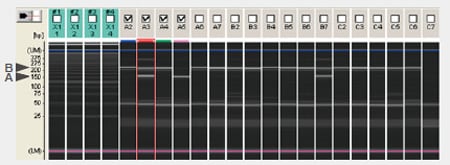SNP Typing
Examples of SNP Typing of Drug-Resistant Gene by Electrophoresis and Blood Direct PCR Using DNA Amplification Reagent
Pharmacogenomics (PGx) refers to the study of the effectiveness of drugs and the prediction of side-effects based on genetic information. Single nucleotide polymorphisms (SNPs) in the genome sequence are expected to find use as pharmacogenomic biomarkers. Research is underway to determine their effectiveness at predicting the side-effects of drugs, such as anticancer agents, and to develop drugs tailored to individual patients.
An example of SNP typing is introduced below.
The ABCC11 gene belongs to the ATP-binding cassette transporter gene family. It is localized on the cell membrane. It is known to be a drug-resistant gene that acts to discharge substances from inside the cell to outside the cell.
The following shows the results of SNP evaluation for this gene by blood direct PCR using Ampdirect Plus DNA Amplification Reagent and the MultiNA Microchip Electrophoresis System for DNA/RNA Analysis.

SNP Typing of ABCC11 Gene Using MultiNA (Gel Image)
Unlike the conventional PCR-RFLP method, which examines the DNA fragment lengths resulting from PCR amplification followed by a sequence-specific cleavage reaction by restriction enzyme digestion, this method permits SNP typing with a single PCR reaction and electrophoresis analysis on a tube. It’s a convenient and economic SNPs typing method suitable for the analysis of multiple samples.
Microchip Electrophoresis System for DNA/RNA

DNA and RNA samples are separated by size by the electrophoresis system using a microchip so that the size of nucleic acid (DNA/RNA) samples is verified and approximately quantitated. The microchip achieves an electrophoresis system capable of speedily conducting electrophoresis separation, and a fluorescent detector ensures that analysis is performed to high sensitivity and, moreover, fully automatically.


